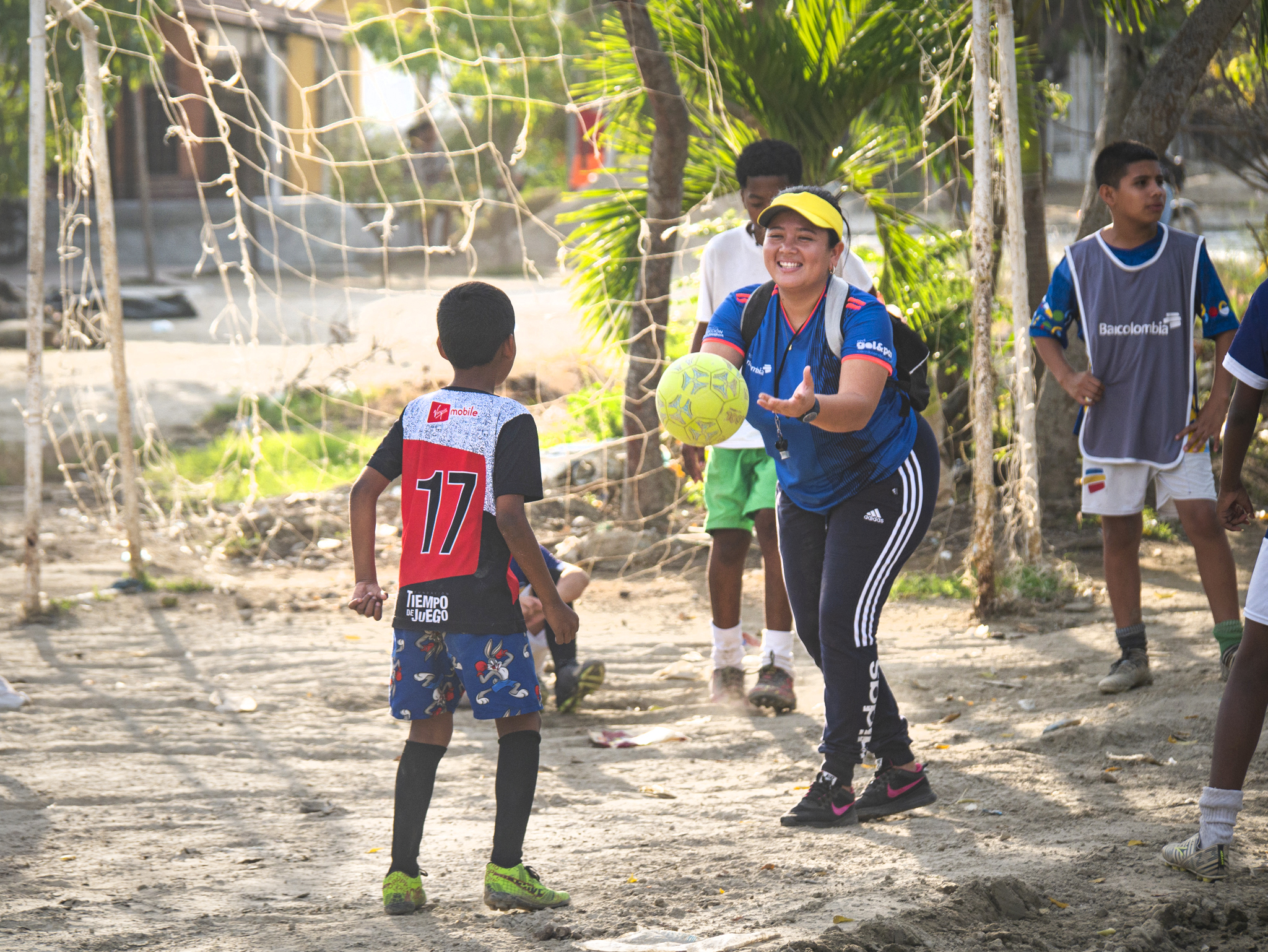Football and Freedom for At-Risk Kids: A Profile of Tiempo de Juego
Since the 1960s, Colombia has suffered from a complex, simmering war between government forces and a variety of rebel groups. Paramilitaries, drug cartels and guerrilla organisations from both the far-left and the far-right have found themselves in a continuous struggle for power against the Colombian government, and consequently, recent decades have been marked by unremitting periods of instability, violence and suffering.
While Colombia is currently experiencing a period of relative peace – due in large part to the signing of a peace agreement with the Revolutionary Armed Forces of Colombia (FARC) in 2016 – it’s undoubtedly a fragile peace, and parts of Colombia still remain entrenched in conflict. Sadly, it’s the nation’s poorer areas which are disproportionately impacted by the ongoing struggle, and by the traumas of the previous century.

Tiempo de Juego (or Game Time in English) is a not-for-profit organisation working to improve the lives of some of Colombia’s most vulnerable individuals – the children and adolescents of these poorer communities. As drug cartels and paramilitary groups attempt to engage kids from a young age, Tiempo de Juego pushes back, offering a wide variety of free-time activities in order to provide the youth with a safe space where they can play and flourish.
The organisation’s ultimate goal is to use football, dance and music – among other pastimes – to teach life skills to Colombia’s children, and give them the opportunity to write a new future for their country. Recently, I spent a week with one of Tiempo de Juego’s chapters in the small town of Ciénaga, on Colombia’s Carribean Coast, in order to learn more about the incredible work that they do.

Anja Huchthausen is one of Tiempo de Juego’s coordinators in the region of Magdalena – home to the communities of Santa Marta and Ciénaga. She came to Colombia in 2016, and began her career at Tiempo de Juego as a volunteer.
“For three months, I was helping with everything,” she explains. “I did football classes, athletics classes, English classes, and I also helped in the organisation of several festivals.”
When her volunteer period was up, she knew she didn’t want to go home just yet.
“I was hoping to stay a little bit longer, and the person who was in charge of the project in Santa Marta, she quit her job, and they were looking for somebody new to be the project leader.”
Anja jumped at the opportunity, and was offered a contract until the end of the year.
“That was six years ago,” she says, “and I’m still here.”

From humble beginnings in 2006, Tiempo de Juego has expanded massively, both in the number of participants in their programs, and in the range of activities offered.
“It started in Bogotá,” Anja explains. “It started with a little ball and a football field.”
The organisation’s founder, Andrés Wiesner, was working as a journalist in the disadvantaged neighbourhood of Soacha. He wanted to tell the community’s stories, and in Colombia, one of the best ways to form connections is through football.
As Andrés became more embedded in the community, he noticed the transformative power that the game was having in the lives of Soacha’s children. Football provided a secure environment for these kids, and fostered opportunities for personal growth.
“Everything started with football, and football is still a huge part of Tiempo de Juego,” says Anja, “but they realised it’s not just through football that you can teach or show life skills, but also through dancing, through art, through communication.”
Today, Tiempo de Juego operates in three different regions in Colombia – Bogotá, Timbiquí and Magdalena – and provides services for more than 6,000 at-risk children. They run a huge range of activities, from football and dance, to circus skills and radio. Anything that provides an opportunity for children to broaden their horizons is enthusiastically embraced.

In addition to their local staff, Tiempo de Juego also welcomes volunteers from all over the world, who are encouraged bring their own talents to the organisation.
“We’re very happy and very grateful for all the volunteers that come here, because I think it’s a mutual experience,” Anja explains. “Our volunteers get inspired, we get inspired, our kids get inspired – so it’s a really nice exchange.”
Past volunteers have introduced new dance styles such as ballet, taught a variety of different language classes, and even written their university theses on Tiempo de Juego’s work. And if you’re nervous about integrating into Colombian culture, Anja emphasises how easy it is to settle in.
“The kids here in Colombia – and especially at the Caribbean Coast – they’re not afraid of anything,” she explains. “They’re hugging you, they’re greeting you, they’re happy to see other faces, and they’re asking you a lot of questions… It’s a whole new world here, but the kids help you dive directly into it and knock down any of those barriers.”

Ultimately however, Tiempo de Juego want their organisation to be fully sustainable, without any reliance on overseas volunteers or donors – and a key aspect of that goal is their Leadership School, which trains participants in their programs to become facilitators and teachers once they graduate. Tiempo de Juego picks out “the best students that [they] have in every kind of class”, and offers them access to a weekly development program.
“The idea is that we’re growing our own teachers for the future,” Anja explains. “All the young leaders who come from the neighbourhoods, from the cities or villages where we are working – they’re empowering themselves to give classes to their communities.”
It’s a slow process, however, and the project requires a long-term commitment. “You can’t turn a twelve-year-old kid into a teacher in one or two years,” Anja says, but the program is beginning to deliver results.
“Nowadays, we’re very lucky because we’ve already offered work to several young teachers from the Leadership School to do what they really love – to teach football, to teach music, to teach dance.”
Indeed, these home-grown teachers are making even more of an impact than Tiempo de Juego’s original staff.
“We’ve already experienced that people take these kinds of young leaders even more seriously because they’re coming from their own community – they’re speaking the same language, they have the same culture,” Anja explains. “So it’s cool to have somebody from your own neighbourhood, because they know the problems that are happening [there].”

In line with the goal of becoming more self-sustainable, Tiempo de Juego has also begun a number of social enterprise projects, aimed at subsidising the costs of their programs while also providing opportunities to the wider community. One such project is El Habitante – a cultural house and hostel in Ciénaga which hosts tourists and volunteers alike, while also providing a space for Tiempo de Juego to run a number of their activities.
“We have a huge room where we do all our dance and music classes,” explains Anja, “and in the other part of the house, we have three rooms where tourists can stay and enjoy Ciénaga.”
“The idea is that all the earnings that we make here in the house, we use to pay directly for the operation of Tiempo de Juego.”
It’s a wonderfully unique environment of cultural exchange, and it’s the only hostel I’ve ever stayed at where local children are constantly running around and involving you in their lives.
“It’s not for having a calm weekend or to be relaxed,” Anja says. “There’s a lot of life here, but it’s very nice in the house because you never get bored, and you always have an idea of what’s going on with the kids.”

Tiempo de Juego also strives to react pragmatically to current issues affecting the communities they work in. I was lucky enough to be in Ciénaga during Tiempo de Juego’s semana púrpura – or ‘purple week’ – in the leadup to the International Day for the Prevention of Violence Against Women on November 25th. Every year, Tiempo de Juego runs a week-long festival aimed at dismantling gender-based stereotypes and increasing respect towards women in the communities they serve.
“We are always very excited because it’s something which connects all of Tiempo de Juego across the whole country,” Anja explains. “It’s very cool – very chévere!”
On top of Tiempo de Juego’s regular activities, the semana púrpura in Ciénaga included a number of online lectures, the opening of a photography exhibition, a community cinema night, a dance presentation, and a series of workshops and other smaller events.
“We have a lot of activities the whole week where we want to show the kids, but also their families and the community, the importance of treating women well, of treating women with respect,” Anja emphasises. “These are very important values which we are eager to be repeating and talking about.”

Tiempo de Juego is an incredible organisation, dedicated to improving the lives of Colombia’s most vulnerable children – both here and now, and well into the future.
On the one hand, their free-time activities provide safe spaces for kids to play and have fun, away from the violence and instability elsewhere in their neighbourhoods. While on the other hand, long-term projects like the Leadership School and El Habitante are working to ensure that these kids have a future that they can truly look forward to.
Ultimately, I was most impressed by Tiempo de Juego’s tireless commitment to investing in the communities and the children that they work with. Their diverse team of staff and volunteers are vibrant and passionate, and are driven by an intense desire to build a better Colombia for everyone.
***
Tiempo de Juego still relies largely on donations from individual and corporate sponsors in order to maintain their programs, and any donation – big or small – makes a direct impact on the lives of Colombia’s children. As always, half of the money that came into the Collect The World Patreon this month was donated directly to Tiempo de Juego. This money will help them to provide meals for the kids at the end of their activities, and to buy materials such as new footballs and uniforms. A huge thank you to all of our supporters who help to keep this project running, and if you’d like to contribute, you can sign up at patreon.com/collect-the-world
***
You can read or listen to the full transcript of my conversation with Anja via the links below:
***
Don’t forget to check out the video I made about Tiempo de Juego as well!


